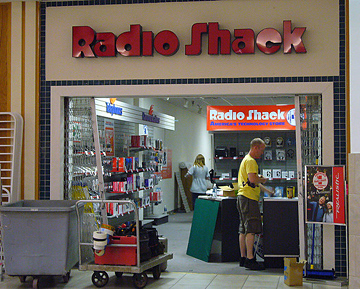RadioShack Closes Stores in Struggle to Survive

ALEXANDRIA, VA.—News reports recently cast a dark shadow over the future of RadioShack, which may not survive 2015.
Bloomberg Business reported that Radio Shack has lost money for eight straight quarters, and The Wall Street Journal said that the company is preparing for bankruptcy protection. RadioShack’s management responded to continuing losses by announcing it will close up to 1,100 stores across the United States. That will still leave the retailer with 4,000 U.S. stores, but the numbers are not particularly favorable toward the remaining stores.
The hard times that have befallen RadioShack seem to be the result of both shifting demographics and consumer tastes. When the company prospered in the 1970s and 1980s, it was one of the few reliable mainstream sources for popular items like CB radios, car stereos and audio components. For a long time, RadioShack had its own popular house brands for these products: Realistic and Optimus.
RadioShack also appealed to electronics experimenters and hobbyists with a stock of components and connectors. Practically every TV and radio station engineer working before 2000 went to RadioShack at some point for an emergency purchase of a connector, transistor, cable or component of some sort. (In the late 1970s, I once used a RadioShack part to repair the on-air mic switch at a radio station where I was the chief engineer.) Over the years, young peoples’ technology interest shifted from electronics with discrete components to computers with surface-mount ICs, and the company’s stock of parts became less relevant.

RadioShack stores in malls have been affected by the drop off in popularity of mall shopping.
The advent of cellphones and RadioShack’s early embrace of them helped the company 10 years ago. However, the past five years have been increasingly competitive in the cellular marketplace, and all but the biggest and most specialized retailers have fallen. (For what it’s worth, I worked for a big online cellphone retailer that actually handled RadioShack’s online cellphone sales. My employer had a good year in 2010, a poor year in 2011, and closed its doors suddenly in 2014, not paying its employees or suppliers. Fortunately, I got out in 2012.)
DEMISE OF MALLS
Get the TV Tech Newsletter
The professional video industry's #1 source for news, trends and product and tech information. Sign up below.
Also hurting RadioShack is the demise of U.S. malls. Practically every mall had a RadioShack, but malls have withered on the vine in the past five years, and many have simply closed. Stores that once saw a lot of foot traffic and browsers now find that many malls have become retail dead zones. One mall near me is practically a 10-acre echo chamber, with perhaps only 30 percent of stores occupied.
RadioShack stores, which are among the most specialized in their product lines in all of retail, were the first to see sales drop off. After all, everyone needs clothes and shoes, but who needs F-connectors and TV antenna mounts? You can get those items at Home Depot and Walmart, anyway.
Few young people today buy car stereos at RadioShack, the CB radio craze is long over and profit margins in cellphones are too thin to support a mainstream brick-and-mortar retailer. Television engineers and technicians still need the occasional part, but broadcast gear is increasingly more about software than hardware. And although RadioShack still sells BNC connectors and RG6 cable, do you want to use them in your HD-SDI cabling plant?
Lately, RadioShack has been seemingly supporting itself on the sale of toys, batteries and cellphone accessories, but it has plenty of competition there as well. Unless a miracle happens, expect that more stores will close in the near future and there’s a real chance that RadioShack will not survive 2015. As it is, Bloomberg and The Wall Street Journal report that RadioShack is in conversations with Sprint to have that company absorb some of RadioShack’s 4,000 remaining stores.
I worked at a RadioShack store in the mid-1970s, and frequently bought components and other items there. The quality was never fabulous and price was usually a bit high, but at least parts were there when I needed them. It is with a little sadness that I inform you that RadioShack may not be there much longer—the victim of shifting technology and consumer taste.
Bob Kovacs is the former Technology Editor for TV Tech and editor of Government Video. He is a long-time video engineer and writer, who now works as a video producer for a government agency. In 2020, Kovacs won several awards as the editor and co-producer of the short film "Rendezvous."

